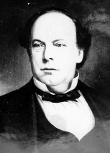The son of an actor (also named George Selth Coppin) George Coppin Jnr appeared on the stage from infancy and by the time he was seven years old he and his sister had their own act. His flair for comic acting saw him branch out on his own at age 16. While acting for the Abbey Street theatre in Dublin he met Maria Watkins Burrough, an actress nine years older than himself, and lived with her until her death in 1848, aged 38.
In 1842 Coppin left for Australia. He quickly established himself in the theatre industry in Sydney, before leaving for Hobart in 1845, where he joined Mrs Clarke's company. Within a few months he had moved to Launceston, taking most of Mrs Clarke's company with him. From there he moved to Melbourne and rapidly became dominant in the theatre industry as he eclipsed his rivals and proved himself a shrewd, if somewhat ruthless, entrepreneur. In 1846 he moved to Adelaide where he established the New Queen's Theatre. As well as his theatre interests Coppin acquired the licence of the Auction Mart Tavern, owned and bred racehorses and established a range of business interests.
Coppin's fortunes changed dramatically when gold was discovered in Victoria in 1851. The mass departures for Victoria and the collapse of his copper mining speculations left him insolvent. He travelled to the diggings where he found entertaining the miners considerably more lucrative than gold digging and by 1853 he was able to repay his creditors. During a brief trip to England he engaged the tragedian Gustavus Brooke and opened the Queen's Theatre in Melbourne. Coppin went into partnership with Brooke and in 1855 he married Brooke's sister-in-law, Harriet Hilsden and, after Harriet's death four years later, her eldest daughter, Lucy.
Coppin entered politics in 1858, leading to a decline in his theatrical and business activities. He resigned in 1863 to concentrate on restoring his fortune and toured the Victorian goldfields and New Zealand, plus a year in America and then to England. While in England he engaged Brooke for another tour, but Brooke's ship was lost on the way to Australia. Coppin continued with his theatrical activities, interspersed with several terms in politics. He regained control of the Theatre Royal, which burned down in 1872, leading to Coppin's establishing the Theatre Royal Pty Association to raise capital for a new theatre. In 1874 he engaged J. C. Williamson and his wife, actress Maggie Moore. In 1881 Williamson became the lessee of the Theatre Royal, leading to the establishment of J. C. Williamson Ltd. He also established a copyright agency which protected the rights of the Dramatic Authors' Association. The first lawsuit to test the validity of these rights was won in the Supreme Court of New South Wales in 1866.
Coppin's retirement in 1882 involved performances lasting a year and taking him to all the Australian colonies. As well as his theatrical legacy, Coppin's philanthropical ventures included the establishment of the Victorian Humane Society, the St John Ambulance in Melbourne, free dispensaries at Richmond, the formation of the Old Colonists' Association and the building of the Old Colonists' Homes at North Fitzroy, as well as organising the Dramatic and Musical Society in 1871. He was an active Freemason and became the first grand master of Victoria. At his death in 1906 Coppin was survived by his wife and their two sons and five daughters, and by two of his three daughters from his first marriage.
[Source: Sally O'Neill, 'Coppin, George Selth (1819 - 1906)', Australian Dictionary of Biography, Volume 3, Melbourne University Press, 1969, pp. 459-462 - (sighted 24/5/2012)]
 1679539619737505428.jpg
1679539619737505428.jpg
 1679539619737505428.jpg
1679539619737505428.jpg